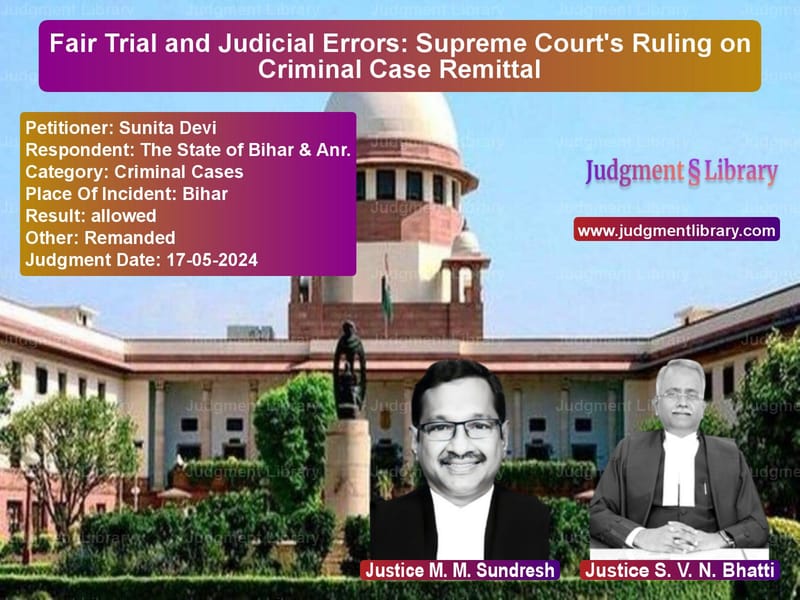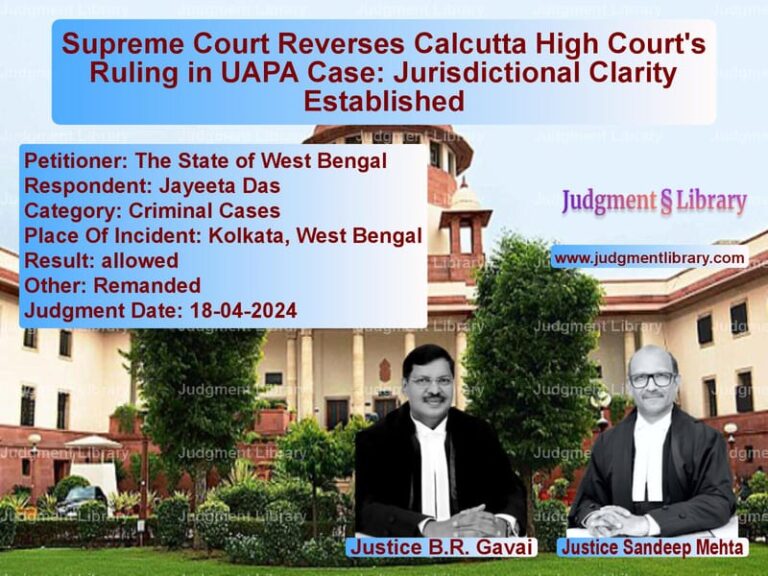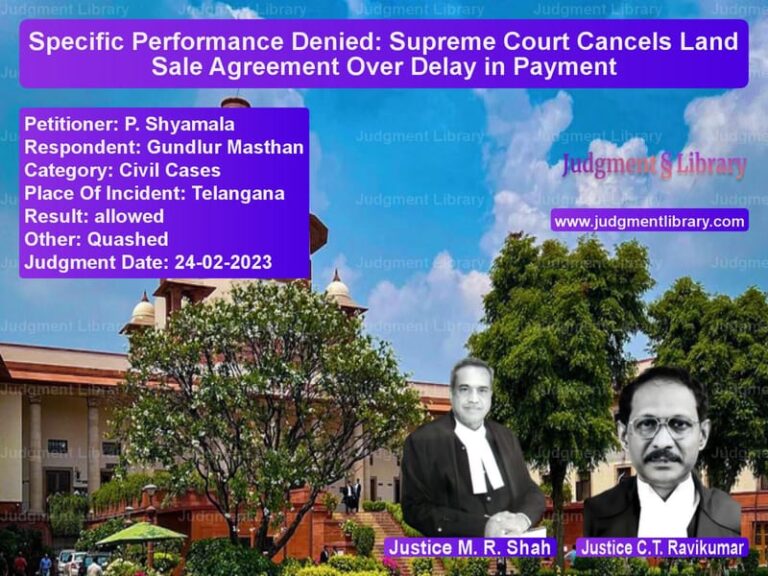Fair Trial and Judicial Errors: Supreme Court’s Ruling on Criminal Case Remittal
The Supreme Court of India, in its judgment dated May 17, 2024, in the case of Sunita Devi vs. The State of Bihar & Anr., addressed critical issues related to the fairness of trials, judicial errors, and procedural violations. The case revolved around a criminal trial where the High Court of Patna had directed a de novo trial, citing multiple procedural lapses by the trial court, which severely impacted the rights of the accused. The Supreme Court’s ruling sheds light on the importance of procedural fairness, judicial diligence, and the need for a balanced approach in criminal trials.
Background of the Case
The case originated from an FIR registered in Crime No. 137 of 2021, concerning an alleged sexual assault on a minor. The FIR was lodged on December 2, 2021, and the accused was arrested on December 12, 2021. The charges included Section 376AB of the IPC, Section 4 of the POCSO Act, 2012, and Section 3(2)(v) of the SC/ST Act, 1989. The trial was conducted at an extraordinarily swift pace, raising serious concerns about procedural fairness and the right of the accused to a fair trial.
Key Procedural Lapses Noted by the Supreme Court
- The charge-sheet was taken on record without the FSL report.
- The accused was produced through video conferencing at various stages without proper legal representation.
- Documents were provided to the defense counsel on the same day as the framing of charges, without sufficient time for review.
- The trial court concluded the trial within an unrealistically short period, raising concerns about judicial haste.
- There was no adherence to the Witness Protection Scheme, 2018 or the Rules for Video Conferencing for Courts, 2020.
Arguments by the Petitioner
Sunita Devi, the appellant-informant, challenged the High Court’s order of remittal, arguing that the trial court had adhered to the procedural requirements and that any procedural flaws did not justify a complete re-trial. Senior Advocate Vikas Singh, representing the appellant, contended:
- The accused was given adequate opportunity to defend himself.
- The trial judge merely followed the mandate of Section 309 of the CrPC, which emphasizes expeditious trials, especially under the POCSO Act.
- The High Court’s decision to order a de novo trial was excessive and unwarranted.
Arguments by the Respondent
Senior Advocate C. U. Singh, representing the respondents, countered the arguments, emphasizing that:
- The trial was conducted in a manner that denied the accused fundamental rights, including the right to legal counsel and proper defense preparation.
- The procedural lapses were severe enough to warrant a fresh trial.
- The accused was unable to adequately consult his lawyer, violating Articles 14 and 21 of the Constitution.
Supreme Court’s Observations and Ruling
The Supreme Court, after examining the records, found that the trial was conducted with undue haste, leading to a miscarriage of justice. The Court emphasized:
“Every trial is a march towards the truth. It is the primary duty of the Court to search for the truth using the procedural law as its tool. By non-compliance of procedural law, justice cannot be allowed to derail.”
Key findings by the Supreme Court included:
- The trial judge acted with excessive haste, making it “humanly impossible” to draft a judgment of 27 pages within 30 minutes.
- The accused’s right to consult a lawyer was severely curtailed.
- There was no valid justification for recording witness statements via video conferencing without adhering to procedural safeguards.
- The High Court was correct in ordering a de novo trial.
Impact of the Judgment
The ruling reiterates the importance of procedural fairness in criminal trials. The Supreme Court emphasized that trials must not be reduced to mere formalities and that judicial officers must exercise discretion carefully.
Additionally, the judgment directed the Government of India to explore the feasibility of introducing a comprehensive sentencing policy, considering the disparities in sentencing practices across the country.
Conclusion
The Supreme Court’s decision in Sunita Devi vs. The State of Bihar underscores the necessity of a fair trial as a fundamental right. It serves as a reminder that while expeditious trials are essential, they must not come at the cost of due process. The ruling strengthens the legal framework governing criminal trials and sets a precedent for judicial accountability.
Petitioner Name: Sunita Devi.Respondent Name: The State of Bihar & Anr..Judgment By: Justice M. M. Sundresh, Justice S. V. N. Bhatti.Place Of Incident: Bihar.Judgment Date: 17-05-2024.
Don’t miss out on the full details! Download the complete judgment in PDF format below and gain valuable insights instantly!
Download Judgment: sunita-devi-vs-the-state-of-bihar-&-supreme-court-of-india-judgment-dated-17-05-2024.pdf
Directly Download Judgment: Directly download this Judgment
See all petitions in Bail and Anticipatory Bail
See all petitions in Custodial Deaths and Police Misconduct
See all petitions in SC/ST Act Case
See all petitions in Judgment by M.M. Sundresh
See all petitions in Judgment by S.V.N. Bhatti
See all petitions in allowed
See all petitions in Remanded
See all petitions in supreme court of India judgments May 2024
See all petitions in 2024 judgments
See all posts in Criminal Cases Category
See all allowed petitions in Criminal Cases Category
See all Dismissed petitions in Criminal Cases Category
See all partially allowed petitions in Criminal Cases Category







